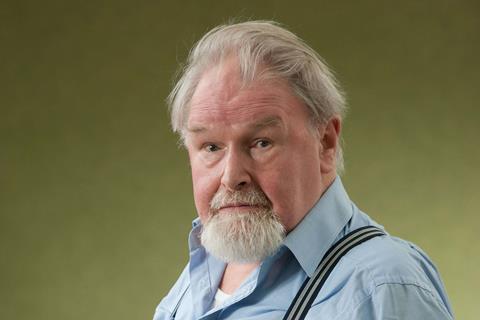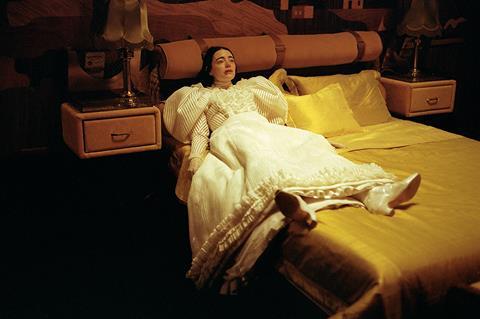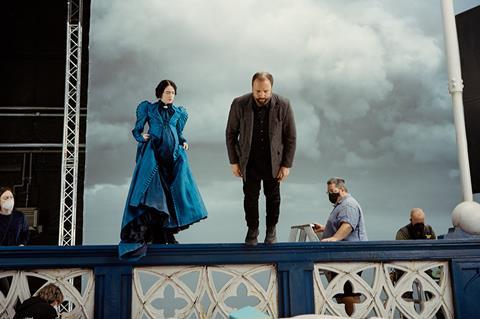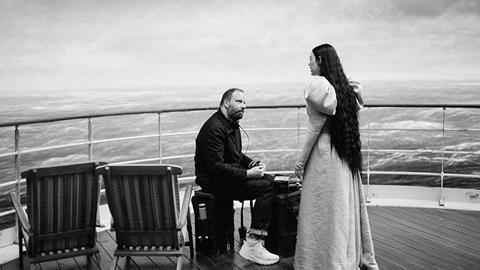Yorgos Lanthimos had not been living in London for long, when, in 2011, he decided to travel to Glasgow and meet Scottish author Alasdair Gray, whose political and phantasmagorical novel Poor Things he wanted to adapt.
“He was a very special presence,” the director recalls, “and the interaction is one of the things that I’ll never forget. It was quick, but so intense. As soon as I got to his house, he put on a jacket and said, ‘Follow me,’ and we just walked around Glasgow. Actually, I was trying to keep up with him — he was, like, 80 years old and running around.” (Gray turned 77 in 2011.) “He took me up to the Necropolis, the university, the park, this that and the other, and was very excited and energetic. And then we went back, he told me he had seen Dogtooth and that he liked it and he’d be happy if I wanted to adapt his book. Then he sent me off — ‘Okay, bye.’”
This was an auspicious, if unusual, beginning but Lanthimos turned to other projects after initial attempts to secure financing came to nought. It would take more than a decade to realise the film that would win this year’s Golden Lion in Venice, led by a barnstorming performance by Emma Stone.

Gray, who died in 2019, had concocted an extraordinary tale that brims with ideas about self-determination, feminism, Scottish nationalism, history and science, dressed in a metatextual story concerning Bella Baxter, a woman who may or may not have been the result of a Frankenstein-like experiment.
While Lanthimos was drawn to the novel’s complex characters and language, its humour and many of its themes, one prominent aspect felt off-limits to the Greek filmmaker. “There’s a part of the book that is a philosophical essay almost, about Glasgow, and Scotland in general, its relationship with the rest of the island and the world — which, of course, I didn’t think could ever be part of a film I’d make. I couldn’t make a Scottish film. But the rest of the story was so universal, so elemental, that I felt I could do that.”
Some of the themes raised by Bella’s singularly independent march into the world certainly appear well-timed. “I wonder, sometimes, would the film have the same impact if I had managed to make it 12 years ago,” he reflects. “I think it probably wouldn’t have, because society has progressed, and is more prepared to accept this kind of story and have this discussion. So maybe it’s a good thing that it took us a while to make it.”
Career trajectory
Since his meeting with Gray, Lanthimos’s career trajectory has seen him progress from being the leading light of the Greek Weird Wave, of which Dogtooth is the most famous example, to an Oscar-nominated filmmaker of international repute. His English-language films include The Lobster, The Killing Of A Sacred Deer and The Favourite, which combine A-list talent with all the originality, strangeness and wit of his early work.
That path has been smoothed by formative repeat collaborations, with actors, writers and in particular his producers, Ed Guiney and Andrew Lowe of Element Pictures, who with Poor Things have now produced all four of his English-language films.
It was Element’s ability to get another difficult proposition, The Lobster, off the ground, at roughly the same time as other producers had thrown in the towel with Poor Things, that signalled to Lanthimos that Guiney and Lowe had a different level of commitment. “When I first came here, I was meeting various producers who were supposedly interested in making films with me, but Element were the ones who actually meant it — whatever it is that I wanted to do, they would find a way. So, whatever I develop now, I go straight to them. I think it’s a very important relationship.”
Nevertheless, he admits that financing Poor Things “wasn’t going to be straightforward”, until the success of 2018’s The Favourite, his raucously entertaining and awards-laden period romp. “Searchlight immediately said, ‘What is it that you want to do next?’ And I went, ‘This one.’ By then Emma [Stone] was on board as well, because we had a great relationship during The Favourite. So, at that moment, it became obvious that it was time to do this.”
As well as playing Gray’s startling heroine — who over the course of the film completes a vast arc from adult infant to mature woman with agency — Stone was eager to be a producer on the film, a role that Lanthimos says she embraced wholeheartedly. “By having the lead actor there for everything — following the research about the world, the design, talking about the other actors who will be with her, just having her as a sounding board for what we were creating, it felt like a very different collaboration.”
It extended into post-production, with Stone involved in how they were approaching the film’s visual effects and sound mix, for example, and when Lanthimos discovered composer Jerskin Fendrix, he sent his music to her. Stone also fed into the response to the actors strike. “She felt that we had to delay the release to enable the actors to be with the film and speak about it. So she’s a key voice in how the film is positioned, as well.”
Poor Things — which Searchlight Pictures began to roll out in North America on December 8, grossing $661,000 from just nine screens on opening weekend, and releases in the UK on January 12 — sees a return to writing duties for Australia-born Tony McNamara, who was Oscar-nominated for The Favourite alongside Deborah Davis.
Lanthimos had written his first two English-language outings with Efthimis Filippou (first scripting in Greek, then translating). But when it came to bringing on a new writer to rework Davis’s long-gestating The Favourites creenplay, he had wanted someone with an Anglo-Saxon sensibility, a natural command of English and a slightly different tone than that of his old friend.
“When I read Tony’s stuff, I immediately felt this excitement of finding a voice that I can relate to and who would probably get me,” says Lanthimos. “That’s a rare thing. Following The Favourite, I felt Tony would be great for Poor Things as well.”
Sexual depiction
McNamara has conjured what his director calls “a rich and specific” screenplay, one that segues between gothic horror, social commentary and some black and bawdy comedy. The film’s depiction of Bella’s sexual education is as striking for the language she uses to describe it, as it is for the raunchy images.
The director says of the approach to the sex: “It is a very important aspect of the book and Bella’s journey. And I felt that we should not shy away from it or be prudish about it, because it would be disingenuous to her character. She’s so free about everything else, how could we not be free about sex and how she discovers it, and all the thoughts that she has about it?”
Stone was immediately on point, he says. “Actually, just before we filmed those scenes, we sat together and figured out what the positions were going to be, what kind of variations and how they could be funny. I think she completely understood that it was essential for the character and for the film to be, well, I’m saying ‘bold’, but it’s just doing justice to [the book]. Otherwise, it wouldn’t work.
“On top of that, Elle [McAlpine], the intimacy co-ordinator, made everything so much more comfortable and protected around the actors and Emma,” Lanthimos continues. “Especially during the brothel scenes, when we had French actors coming in for a couple of hours each to do a sex scene.”

Stone, as best actress (musical or comedy), is among Poor Things’ seven Golden Globe nominations, which also include for best picture (musical or comedy), director, screenplay and supporting actor (for both Willem Dafoe and Mark Ruffalo).
Stone has spoken enthusiastically of her experience making the silent short Bleat with Lanthimos on the Greek island of Tinos in 2020. It is tempting to think this may have helped her performance as Bella, which relies as much on physicality and expression as it does dialogue.
“Maybe, you’d have to ask her,” Lanthimos says, smiling. “She loves to challenge herself and do different things, even if it’s not necessarily so obvious to other people. I remember her always saying, ‘I want to play a mute person in a film,’ or something like that. And she loved the idea of making the silent film.”
In fact, Stone was struck by everything about the Bleat shoot, the director notes. “I always strive to go back to how I was making films in Greece, while making larger-scale films, to try and maintain this kind of intimacy and flexibility and spontaneity you have when you’re two, three, four people just making something. The short film was like that, and Emma experienced that. She went, ‘Why can’t we do everything like this?’ And, in Poor Things, which was the biggest film I’ve made, we kind of managed to do that.”
A bigger scale

While Poor Things involved vast and elaborate sets in two Budapest studios, including an entire walk-through house, a Parisian square and a Lisbon cityscape, Lanthimos and director of photography Robbie Ryan (also returning from The Favourite) approached scenes as though they were location shoots, lighting from outside. “When we go into a room, or a space to film, it’s just the camera and the actors, the sound, and Hayley [Williams] the AD,” he says. “And that’s it. We’re five people, while there’s 100 people outside the closed door.
“So, we’re still making this intimate, small film, which comes from all our experiences working together and reaching that understanding.”
That said, Lanthimos’s immersive, intoxicating vision for Poor Things did require an epic scale, including use of the largest soundstage in continental Europe. Did he have to pinch himself when walking onto the sets?
“Well, I’m sorry to say that I felt they were not big enough,” he laughs. “Everybody was going, ‘These are huge, these are amazing, we haven’t seen anything like that for years.’ And I was like, ‘How is he gonna get lost in Lisbon? This is just two streets.’ It was a weird kind of thinking, seeing it and being definitely impressed, but at the same time thinking that we’ll need to do some tricks to make it look, you know… bigger.”
The director’s next film will not have the same concerns. Kind Of Kindness (formerly known as And), an anthology film that shot in the US in late 2022, reunites Lanthimos with Stone, Willem Dafoe and Margaret Qualley from the Poor Things cast, as well as Ryan behind the camera, but sees him return to co-writing duties with Filippou. The plot is still under wraps, though Lanthimos will say that it involves a core of five actors, each of whom plays a different part in every one of the three stories.
“It’s a much simpler, contemporary film,” he adds. “So, it was a nice breath of fresh air to go, ‘Okay, we’re going to locations, we don’t need lights, we just film.’”


























No comments yet